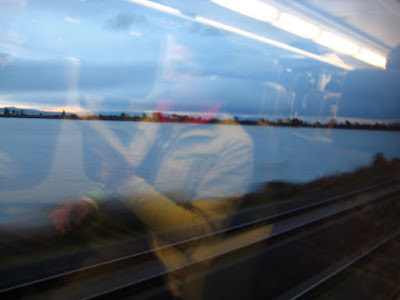I hate leaving a cranky or lugubrious post at the top of the blog like the one below, and that tends to send me to writing more quickly. And this evening is devoted to laptoping on the bed with, at least for now, American Idol on the boobtubery in the background ... devoted to the laptop because I have a big presentation at MRU tomorrow, and I need to practice.
So a break from practicing ...
The photo above is of pond that we flash by daily on Caltrain, and the face is a guy who I find vaguely alluring who sits near me often enough. I lift up my head from whatever long-past century is populating my morning reading, and wonder what thoughts are passing through his, or some other soul's, head. Who knows.
The last few days of train travel to work have been devoted to the culminating chapter 7 (pages 329-368) in book 3 of Volume 2 of Marshall Hodgson's Venture of Islam; the chapter is called "Cultural Patterning in Islamdom and the Occident". Hodgson is the consummate big historian ... the sweep of history, its broad lines and the deep and enduring and irreducible contradictions that drive it. In this chapter, he confronts the deep lines of approach differentiating the peak of Islamic history in its great middle period from the earliest stirrings of the rise of the West in the high middle ages.
His general thesis is to counterpose the corporatism of the Western middle ages against the contractualism of the middle period of Islam. Reduced as much as I can, it counterposes the corporatist notion that a man's place is fixed by reason of his origins and his associations with corporate bodies such as the church or the feudatory as against the contractual notion of society in which everyone is broadly equal under the flattening religious compromise of the Shariah and in which social and political success is based upon the ability to command it within the terms provided. Social movement in medieval Europe was nearly impossible but there was a certain safety in knowing where you belonged. Islamic society provided for mobility by reason of its broadly applicable social rules, but nothing was guaranteed.
700 years later, the terms seem switched. Middle Eastern Islamic society is frozen, albeit still with a relatively flat application of religious legal standards across a variety of cultures, while European society is as open as any society has ever been with more possibility of movement than anyone in previous centuries could possibly imagine.
This fascinates me about history, how terms switch and retreat and transform. And how people soldier on regardless, fundamentally similar despite differences that makes them incomprehensible to each other.
What motivates a person as he moves about his society? Why does the man in the window above go to work? Does he see himself fixed in a web beyond his control; does that relax him, make him feel that at least there is something certain? Or, does he create an inner reality that bears no relation to what he actually experiences all day long? Is that fantasy a frustration or a motivation?
And how do we assess how a similar person in past eras constructed his life, and thought about his prospects and where he was headed?
So I'm thinking about these matters these days in the train and when I walk the dog, and whenever. I wonder about my prospects, and what I will leave behind. I wonder who I am and whether any of the people I think about would understand me. I wonder about the man reflected in the window, and I wonder about the pond on the other side, and I wonder about all the people who have ever wondered while gazing blankly, introspectively, at a pond and the birds who move about as if we do even exist.
Photo by Arod.
Tuesday, February 12, 2008
Wondering
Posted by
Arod in San Francisco
at
20:45
![]()
![]()
Labels: History, Islam, Living and Thriving
Subscribe to:
Post Comments (Atom)



No comments:
Post a Comment